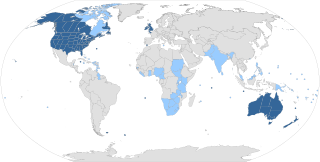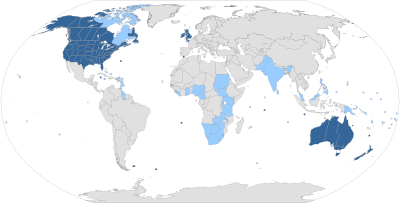A commonwealth is a traditional English term for a political community founded for the common good. The noun "commonwealth", meaning "public welfare, general good or advantage", dates from the 15th century. Originally a phrase, it comes from the old meaning of "wealth", which is "well-being", and is itself a loose translation of the Latin res publica. The term literally meant "common well-being". In the 17th century, the definition of "commonwealth" expanded from its original sense of "public welfare" or "commonweal" to mean "a state in which the supreme power is vested in the people; a republic or democratic state".

The Westminster system, or Westminster model, is a type of parliamentary government that incorporates a series of procedures for operating a legislature, first developed in England. Key aspects of the system include an executive branch made up of members of the legislature, and that is responsible to the legislature; the presence of parliamentary opposition parties; and a ceremonial head of state who is separate from the head of government. The term derives from the Palace of Westminster, which has been the seat of the Westminster Parliament in England and later the United Kingdom since the 13th century. The Westminster system is often contrasted with the presidential system that originated in the United States, or with the semi-presidential system, based on the government of France.
De facto describes practices that exist in reality, regardless of whether they are officially recognized by laws or other formal norms. It is commonly used to refer to what happens in practice, in contrast with de jure.
Premier is a title for the head of government in central governments, state governments and local governments of some countries. A second in command to a premier is designated as a deputy premier.

A federation is a political entity characterized by a union of partially self-governing provinces, states, or other regions under a federal government (federalism). In a federation, the self-governing status of the component states, as well as the division of power between them and the central government, is constitutionally entrenched and may not be altered by a unilateral decision, neither by the component states nor the federal political body.

A capital city or just capital is the municipality holding primary status in a country, state, province, department, or other subnational division, usually as its seat of the government. A capital is typically a city that physically encompasses the government's offices and meeting places; the status as capital is often designated by its law or constitution. In some jurisdictions, including several countries, different branches of government are in different settlements, sometimes meaning multiple official capitals. In some cases, a distinction is made between the official (constitutional) capital and the seat of government, which is in another place.
An official language is a language having certain rights to be used in defined situations. These rights can be created in written form or by historic usage.
A dependent territory, dependent area, or dependency is a territory that does not possess full political independence or sovereignty as a sovereign state and remains politically outside the controlling state's integral area. As such, a dependent territory includes a range of non-integrated not fully to non-independent territory types, from associated states to non-self-governing territories.

The English-speaking world comprises the 88 countries and territories in which English is an official, administrative, or cultural language. In the early 2000s, one billion to two billion people spoke English, making it the largest language by number of speakers, the third largest language by number of native speakers, and the most widespread language geographically. The countries in which English is the native language of most people are sometimes termed the Anglosphere. Speakers of English are called Anglophones.
A national language is a language that has some connection—de facto or de jure—with a nation. The term is applied quite differently in various contexts. One or more languages spoken as first languages in the territory of a country may be referred to informally or designated in legislation as national languages of the country. National languages are mentioned in over 150 world constitutions.
A dominion was any of several largely self-governing countries of the British Empire. Progressing from colonies, their degrees of colonial self-governance increased unevenly over the late 19th century through the 1930s, and some vestiges of empire lasted in some areas into the late 20th century. With the evolution of the British Empire into the Commonwealth of Nations, finalised in 1949, the dominions became independent states, either as Commonwealth republics or Commonwealth realms.
The decolonisation of Oceania occurred after World War II when nations in Oceania achieved independence by transitioning from European colonial rule to full independence.





